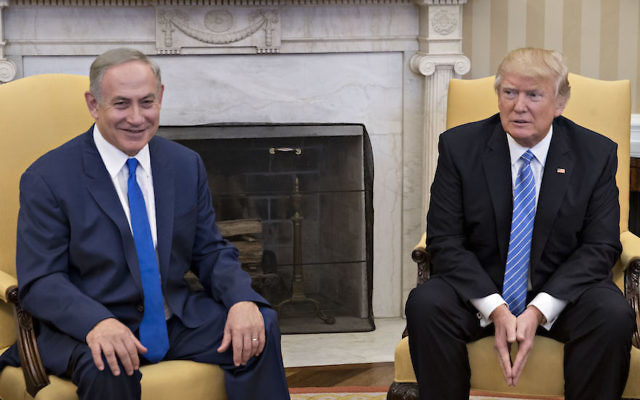Bibi buoyant after Washington trip
Benjamin Netanyahu was in high spirits on Sunday as he left Israel for Singapore and then Australia.
Benjamin Netanyahu was in high spirits on Sunday as he left Israel for Singapore and then Australia, declaring that last week’s summit in Washington showed that he’s on the same page as Donald Trump.
“The two of us see eye to eye on the main – and growing – threat from Iran and the need to stand against Iranian aggression in the various spheres,” Netanyahu told his cabinet.
Trump upped his ante against Iran ahead of his summit with Israel’s Prime Minister, and, as they stood together, described the West’s nuclear agreement with Tehran as “one of the worst deals I’ve ever seen”.
He said: “My administration has already imposed new sanctions on Iran, and I will do more to prevent Iran from ever developing – I mean ever – a nuclear weapon.”
The common ground on handling the Iranian threat, as well as other dangers to Israel, strengthens Netanyahu, especially at the moment as Iran and other entities are flexing their muscles against Israel.
On Monday, ISIS militants fired two rockets from Sinai in to Israel, and on Tuesday Iran’s supreme leader Ayatollah Ali Khamenei issued a rallying cry for more Palestinian violence against Israeli targets, saying in a speech that Palestinians “have no option other than keeping the flames of fighting alight”. He added, “By Allah’s permission, we will see that this intifada will begin a very important chapter in the history of fighting and that it will inflict another defeat on that usurping regime.”
Bar-Ilan University’s Professor Jonathan Rynhold told The AJN that Trump’s stance on Iran is resonating well in Israel. “I think what we have is an administration that is more instinctively in line with the Israeli public and the Israeli elite,” he said.
But it’s not all as simple as it appeared in the convivial Netanyahu-Trump meeting, Rynhold stressed. This is because while, on the one hand, Trump is harsh about Iran, on the other “there is a concern about Trump’s desire for rapprochement with Russia, which in effect provides air cover for Iran in Syria.”
In other words, while Trump is taking Iran to task, he is expected to warm relations with Russia, which is actually shielding Iran as it helps the Syrian regime fight its civil war.
As well as discussing Iran in Sunday’s cabinet meeting, Netanyahu said that he and Trump agreed to try to upgrade US-Israel relations with regards to security, intelligence, cyber industries, technology, economics and many other areas.
The settler right is waiting with bated breath to find out how to interpret exchanges between Netanyahu and Trump regarding the issues that it cares most about.
There are rumours that Trump’s request for restraint on settlement will lead to the cancellation of plans for the establishment of a new settlement, and mixed messages emerging from Jerusalem on the issue.
Meanwhile, some on the right are excited that Trump said during the Netanyahu summit that he’s “very happy” in theory with a two-state or one-state solution.
One of the talking points in Israeli politics this week is Trump’s belief that the starting point for an Israeli peace deal needn’t necessarily be the Palestinians, but may be other players in the Arab world who will then bring the Palestinians on side.
Netanyahu is enthusiastic about this idea. “I believe that the great opportunity for peace comes from a regional approach from involving our newfound Arab partners in the pursuit of a broader peace,” he said. The Obama administration was thought to be sceptical, but Trump is keen. He said that he and Netanyahu discussed “a much bigger deal” than the one normally spoken about – one which “would take in many, many countries and it would cover a very large territory”.
It emerged after the Trump-Netanyahu summit that Obama may have been less sceptical about a regional deal than has been assumed. It emerged on Sunday that the previous US administration floated a regional peace plan last year.
Obama’s secretary of state John Kerry had offered Netanyahu a regional peace plan that had Egyptian and Jordanian backing, and was urging leaders from these countries to get Saudi Arabia and the United Arab Emirates on board. Netanyahu reportedly rejected the plan saying he couldn’t get it past his -ministers.
NATHAN JEFFAY


comments